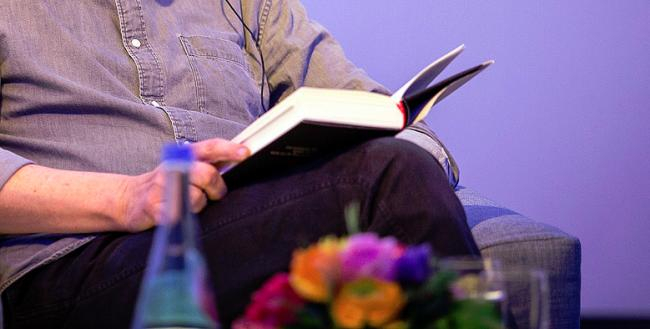11.09.17 | At the International Literature Festival in Berlin, scientists of the Leibniz Centre for Tropical Marine Research (ZMT) discuss with international authors.
This week the International Literature Festival has begun in Berlin with 200 authors from more than 40 countries including popular favourites such as Donna Leon, Arundhati Roy, and Yasmina Reza. As part of the Year of Science “Seas and Oceans”, the festival is offering the programme “Reading the Currents. Stories from the 21st Century Sea”. Twelve international authors will present novels, short stories, and texts on the subject of the sea – written exclusively for the literature festival – and enter into discussions with scientists from the fields of biology, geology, ecology, and sociology.
It is about living with the sea, the living creatures of the oceans, and above all the environmental changes to which the oceans are exposed today. How does literature react to our multifaceted present day? The aim is to open up an artistic approach to current topics as well as to present the scientific facts for debate.
Two researchers from the Leibniz Centre for Tropical Marine Research (ZMT) in Bremen, who are involved in the interface between science and art, also enter into a dialogue with the authors.
On 11 September, the biologist Professor Martin Zimmer will talk with JoeAnn Hart, a journalist and novelist from the U.S., who has been awarded a prize for her literary commitment to environmental issues, about her text “Island Hospitality”. It deals with the disappointment of tourists who encounter reefs destroyed by coral bleaching.
On 12 September, as part of the festival’s children and youth programme, Zimmer will talk with Jan Paul Schutten from the Netherlands about the extinction of the trilobites in the Palaeozoic due to the climate change which occurred during that era. “As a biologist with a strong background in Evolutionary Biology, I like the idea of illustrating for young readers by means of the example of the extinction a formerly successful group of animals, what mankind is doing wrong,“ said Martin Zimmer.
On 16 September, Professor Anna-Katharina Hornidge, head of the ZMT research group “Development and Knowledge Sociology” will talk with the Japanese writer Yoko Tawada about her text “Meine Salzwassermutter von Minamata zu Fukushima” (My Saltwater Mother. From Minamata to Fukushima). Since the Fukushima catastrophe, the Kleist Prize-winning author has been advocating a cultural opening of Japan and has been speaking out against nuclear power and all forms of war.
“As part of the generation that grew up with books by Gudrun Pausewang and parental fears after Chernobyl, I see in Tawada’s work the knowledge of our own fallibility. This fallibility is symbolised by the effects of radioactivity in the sea that we cannot foresee or fathom. Her texts enable readers to deal with the human-created and uncontrollable dangers of modernity in an intellectual and emotional way,” said Hornidge, explaining her interest in the literary work of Yoko Tawada.
Dates, times, and venues of events in which ZMT scientists are participating:
11 September 2017, Buchhändlerkeller, 9:00 PM
JoeAnn Hart and Martin Zimmer
“Island Hospitality”
12 September 2017, Haus der Berliner Festspiele, 9:00 AM
Jan Paul Schutten and Martin Zimmer
“Hoe de Trilobieten uiteindelijk de Oceanen verdwenen”
16 September 2017, Buchhändlerkeller, 9:00 PM
Yoko Tawada and Anna-Katharina Hornidge
“Meine Salzwassermutter von Minamata zu Fukushima”
(My Saltwater Mother. From Minamata to Fukushima)





